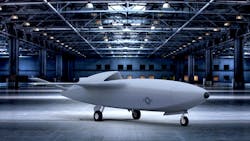Air Force chooses nine companies to provide enabling technologies for Skyborg unmanned combat aircraft
WRIGHT-PATTERSON AFB, Ohio – U.S. Air Force unmanned vehicles experts are asking nine companies to provide mature enabling technologies to prototype a low-cost unmanned combat aircraft called Skyborg, which will have artificial intelligence (AI) and modular payloads for a wide variety of fighter and ground-attack capabilities.
Officials of the Air Force Life Cycle Management Center at Wright-Patterson Air Force Base, Ohio, announced Tuesday that the nine companies will share as much as $400 million develop technologies for a prototype Skyborg Autonomous Unmanned Combat Air Vehicle (UCAV).
the Skyborg unmanned combat aircraft is to be an inexpensive, quick-turnaround, autonomous UCAV that will be a modular, fighter-like aircraft that can take on increasingly complex technologies and tasking to support the warfighter.
Related: Top enabling technologies for the warfighter in the 2020s
The nine companies that will share the $400 million for the Skyborg Vanguard project budget are:
-- AeroVironment Inc. in Simi Valley, Calif.;
-- the BAE Systems Controls & Avionics Solutions segment in Endicott, N.Y.;
-- Blue Force Technologies in Morrisville, N.C.;
-- Fregata Systems LLCFregata Systems LLC in St. Louis;
-- the Lockheed Martin Corp. Aeronautics segment in Fort Worth, Texas;
-- Wichita State University in Wichita, Kan.;
-- Autonodyne LLC in Boston;
-- NextGen Aeronautics in Torrance, Calif.; and
-- Sierra Technical Services Inc. in Tehachapi, Calif.
These contracts provide for Skyborg prototyping, experimentation, and autonomy development to deliver missionized prototypes in support of operational experimentation, Air Force officials say.
Once fielded, the Skyborg unmanned combat aircraft will enable warfighters to adjust Skyborg's payload and autonomy modularly to support an array of missions. Researchers are interested only in technologies that quickly can move to operational use.
Advanced autonomy and artificial intelligence (AI) are poised to change the character of the international battlefield substantially in the near future, Air Force researchers explain. Researchers want to field an autonomous system that meets an immediate operational need, as well as that can jump-start complex AI development, prototyping, experimentation, and fielding.
Skyborg will be attritable, meaning it will have a lost enough cost to sacrifice it in combat to attack high-value targets. It also will be reusable after flying routine missions. It also have the ability of an intelligent system to compose and select independently among different courses of action.
Its AI embedded computing will have modular components and protocols that conform to open-systems standards, which integrate easily with third-party products. Open systems mitigate risks associated with technology obsolescence, vender-unique technology, and single sources of supply and maintenance, Air Force researchers explain.
Skyborg will have an open AI software architecture and toolkits that enable timely modifications and upgrades of complex autonomous behaviors; have modular open-systems mission hardware; and meet military certification and acquisition requirements.
Air Force researchers are interested in the ability autonomously to avoid other aircraft, terrain, obstacles, and hazardous weather; conduct autonomous takeoffs and returns; have separate sensor payloads and flight computers to allow for modular adjustments and adaptability; and have mission-planning software that integrates with next-generation Air Force mission planning tools that emphasize modularity and openness.
Researchers also want Skyborg to be an autonomous aircraft that can operate with personnel who have limited engineering or pilot experience. On these contracts, the nine companies will do the work at various locations around the U.S., and should be finished by July 2026.
About the Author
John Keller
Editor-in-Chief
John Keller is the Editor-in-Chief, Military & Aerospace Electronics Magazine--provides extensive coverage and analysis of enabling electronics and optoelectronic technologies in military, space and commercial aviation applications. John has been a member of the Military & Aerospace Electronics staff since 1989 and chief editor since 1995.
